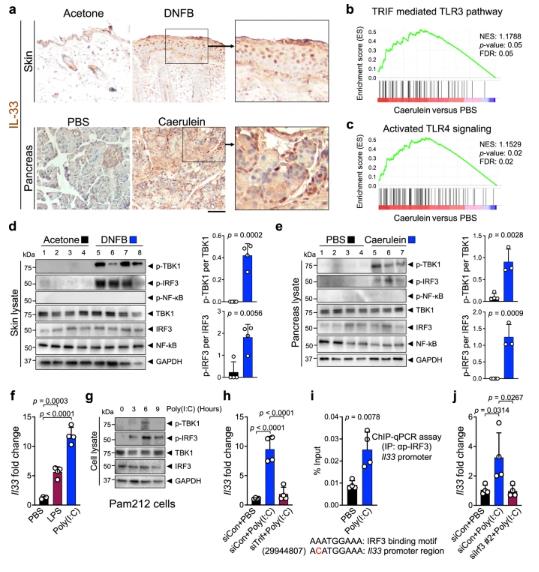Uncategorized Tuesday, 2024/06/11
Researchers from Harvard Medical School and Massachusetts General Hospital published a research paper in the journal Nature Communications titled: Statin prevents cancer development in chronic inflammation by blocking interleukin 33 expression.
This study suggests that commonly used cholesterol-lowering drugs such as statins can prevent the progression of chronic inflammation to cancer by blocking the expression of interleukin-33 (IL-33).
Our Related Proteins
| Cat. No. | Product Name | Species | Source | Tag |
| IL33-122H | Active Recombinant Human Interleukin 33, HIgG1 Fc-tagged, mutant | Human | CHO | Fc |
| IL33-124H | Active Recombinant Human Interleukin 33, HIgG1 Fc-tagged | Human | CHO | Fc |
| IL33-121H | Active Recombinant Human Interleukin 33, MIgG2a Fc-tagged | Human | CHO | Fc |
| IL33-215H | Active Recombinant Human IL33 protein | Human | E.coli | N/A |
| IL33-2218H | Active Recombinant Human IL33 protein, His-tagged | Human | HEK293 | His |
| IL1A-01H | Recombinant Human IL1A protein | Human | E.coli | N/A |
| IL1A-14166H | Recombinant Human IL1A, GST-tagged | Human | E.coli | GST |
| IL1RL1-3991H | Active Recombinant Human IL1RL1 protein, His-tagged | Human | HEK293 | His |
| IL1RL1-775H | Recombinant Human IL1RL1 protein(Met1-Phe328) | Human | HEK293 | N/A |
IL-33 is a member of the IL-1 cytokine family, which drives type 2 immune response in allergic inflammation by triggering activation of Th2 cells and type 2 intrinsic lymphocytes (ILC2). IL-33 is an important promoter of chronic inflammation, and by binding to its receptor tumor suppressor 2 (ST2, also known as IL1RL1). IL-33 promotes the development of a chronic inflammatory environment in stress and inflammatory tissues. IL-33 and ST2 are highly expressed in chronic inflammatory diseases (including inflammatory bowel disease, pancreatitis, hepatitis, and chronic obstructive pulmonary disease).

IL-33 plays a complex role in the occurrence and development of tumors. Inducing IL-33 can inhibit the growth of colon tumors in mice and activate CD8+T cells and natural killer (NK) cells, thereby inhibiting lung metastasis of tumors. On the contrary, the up-regulation of IL-33 during the transition from acute inflammation to chronic inflammation initiates the development of the tumor's immune environment. It is worth noting that IL-33 also acts as a nuclear protein, promoting tumor development in chronic inflammation by regulating the SMAD signaling pathway. Therefore, blocking the expression of IL-33 rather than its individual cytokine function is crucial for achieving cancer prevention in chronic inflammation.
In this study, the research team demonstrated, based on cell lines, animal models, human tissue samples, and epidemiological data, that environmental toxins (such as exposure to allergens and chemical stimuli) activated two interconnected signaling pathways - the TLR3/4 signaling pathway and the TBK1-IRF3 signaling pathway. This activation leads to the production of IL-33, which stimulates inflammation of the skin and pancreas, leading to the occurrence of cancer.
Then, the research team screened the FDA-approved drug library in the United States and found that a statin drug, pitavastatin, effectively inhibits the expression of IL-33 by blocking the activation of the TBK1-IRF3 signaling pathway.
Next, the research team confirmed in the mouse model that pitavastatin inhibited environment-induced skin and pancreatitis, and prevented the occurrence of inflammation-related pancreatic cancer.
In human pancreatic tissue samples, IL-33 was overexpressed in patients with chronic pancreatitis and pancreatic cancer compared with normal pancreatic tissue. In addition, in the analysis of electronic health record data of more than 200 million people in North America and Europe, the use of pitavastatin was associated with a significant reduction in the risk of chronic pancreatitis and pancreatic cancer.
These research findings suggest that blocking the production of IL-33 with pitavastatin may be a safe and effective preventive strategy to inhibit chronic inflammation and the subsequent development of certain cancers. The research team stated that the next goal is to further investigate the effects of statins on preventing cancer development in chronic inflammation of the liver and gastrointestinal tract, and to identify other novel treatment methods that inhibit chronic inflammation that is prone to cancer.
Related Products and Services
CD Antigens Targets of CAR-T Cell Therapy Cytokines Cancer Drug Targets Immune Checkpoint Proteins Protein Interaction Service Protein Expression and Purification Services Drug Discovery Screening Protein Pathway Profiling
Reference Park, J. H., Mortaja, M., Son, H. G., et al. (2024). Statin prevents cancer development in chronic inflammation by blocking interleukin 33 expression. Nature Communications, 15(1), 1-15. https://doi.org/10.1038/s41467-024-48441-8
